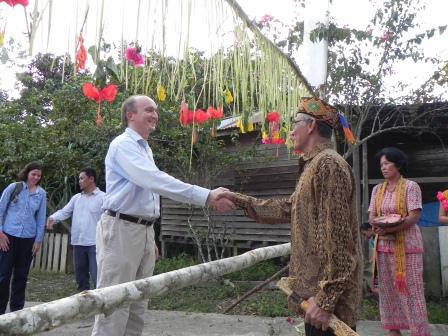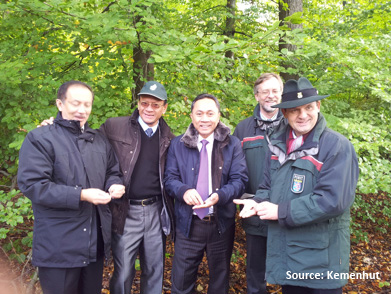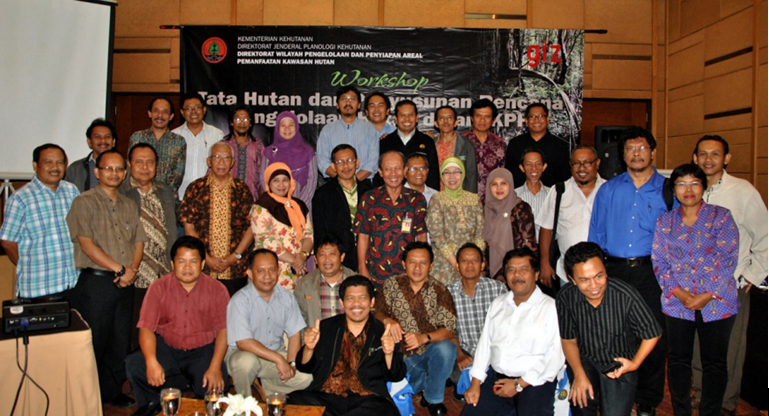FORCLIME
Forests and Climate Change ProgrammeTechnical Cooperation (TC Module)

Select your language

From 4-8 November Counsellor Andreas Beckermann, Head of Development Cooperation at the German Embassy, visited FORCLIME project sites in Kapuas Hulu District, West Kalimantan, to get a first-hand impression of programme activities and achievements. “To me it is very interesting to see a project in mid-process”, said Mr. Beckermann, “and to learn about the context and conditions in which the German-Indonesian cooperation operates.” The remoteness of some of the project locations impressed the visitors who had to walk for one hour from the last road accessible by car to reach one of the villages which FORCLIME has supported with participatory mapping as preparation for developing REDD+ Demonstration Activities. Another village visited was Menua Sadap where the group learned about all the necessary ingredients and challenges in supporting the development of local renewable power generation. Such steps include feasibility studies, a legal basis like the MoU between the district government and the National Park of Betung Kerihun on the promotion of renewable energy in the National Park area and its buffer zone, the setting up and training of a village management committee and finally the installation of the turbines themselves in a river that can swell by a few meters over night during the rainy season.
On this field visit Counsellor Beckermann was accompanied by the Embassy’s Press Attachée, Inge Seitz, and three journalists from Jakarta based media. “This was the first time that journalists have been invited to accompany an Embassy visit,” said Ms. Seitz at the end of three memorable days, “and I am very glad that it was a success.”

From 8 to 9 October, the Indonesian Minister of Forestry, Zulkifli Hasan, visited Germany to meet with high level government representatives with a view to enhancing cooperation in the area of forestry between Indonesia and Germany which has a 45 year old history. Minister Zulkifli Hasan had bilateral meetings with the State Secretary of the German Federal Ministry of Food, Agriculture and Consumer Protection, Mr. Peter Bleser, and with the Hessian State Secretary of Environment, Energy, Agriculture and Consumer Protection, Mr. Mark Weinmeister. Moreover, the programme included a roundtable dialogue with key persons from development cooperation and academia on the forest sector reform in Indonesia as well as a “field visit” to one of the Forest Management Units in the State of Hesse.
At the site of the Forest Management Unit visited, Chausseehaus Wiesbaden, Minister Zulkifli Hasan got first hand information about the German system of decentralised forest management structures which have in many ways inspired the ongoing forest reform and establishment of field level forest management units in Indonesia. He was accompanied by the Director General of the Hessian Forest Administration and the Director of the state enterprise HessenForst, the Indonesian Ambassador for the Federal Republic of Germany and the Secretary General of the Indonesian Ministry of Forestry.

From 19 to 22 September university lecturers from all over Indonesia came together in Jakarta to learn about and discuss first experiences with Forest Use Planning and Forest Management Planning in Forest Management Units (FMU). The workshop had been organised by the Directorate General of Forestry Planning through the Directorate of Area Management and Preparation of Forest Area Utilization (WP3H) in cooperation with GIZ FORCLIME. This workshop was the first move in developing an "expert pool" that eventually will provide continuous technical support to the development and operation of FMUs in Indonesia. The workshop was attended by 33 academics from 21 state universities in Indonesia.
In his opening speech the Director General of Forestry Planning, Ir. Bambang Soepijanto, MM., mentioned that forest use planning and forest management planning have a very strategic position in the implementation and operation of the FMU at the site level. He expressed his expectation that the workshop participants will be able to provide new ideas for forest use planning and forest management planning that can be used for FMU development.
Topics delivered during the workshop included the concept of and rationale for FMU development (Prof. Dr. Ir. Hariadi Kartodihardjo M.Sc.), organisational options for the financial management of an FMU as a business entity (Dr. Ir. Bramasto Nugroho, M.Sc.), and the progress of FMU development to date (Mr. Is Mugiono, MM., Director of WP3H). These introductory presentations were followed by an in-depth technical discussion related to forest use planning and forest management planning. The second day was devoted to sharing experiences from first steps in forest use planning and forest management planning in the Model Forest Management Unit of Berau Barat. While the Head of the FMU, Bpk Hamzah, provided insights into the local context and the reality faced by an FMU manager, two academics from Mulawarman University (Prof. Dr. Ir. Mustofa Agung Sardjono, Dr. Ir. Soeyitno Soedirman) presented their approach of advising and facilitating the process which constitutes one of the FORCLIME supported activities. The presentation aimed to demonstrate the planning stages as an example for all participants for when they might facilitate the preparation of the Forest Management Plan for the FMU in their region.
For further information, please contact:
Barbara Lang (barbara.lang@giz.de) or
Gatot Moeryanto (gatot.moeryanto@giz.de) or
Yenny Syafrina (yenny@dephut.go.id)


